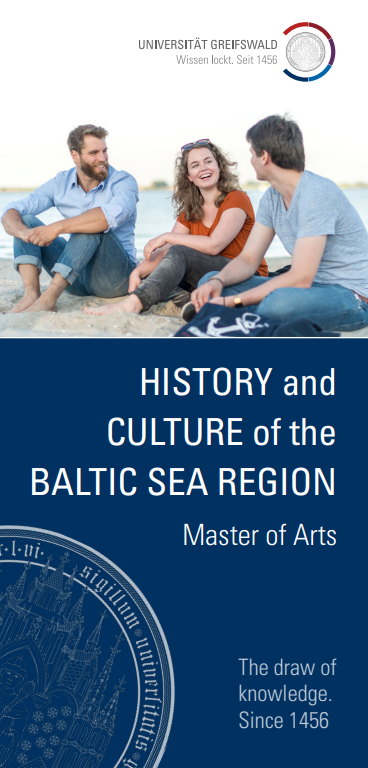Necessary skills
This Master‘s programme is open to students with a Bachelor‘s degree or equivalent in the humanities (in particular philology, cultural and historical sciences, or related fields) who wish to specialise in the culturally and historically complex Baltic Sea region. Proof of English language skills at level B2 (CEFR) or proof of at least seven years of school English are necessary for admission. Basic knowledge of German (A1) is desirable, but not a necessary precondition to enrol in the study programme.
What this subject is about
The interdisciplinary and international Master’s programme combines courses on cultural studies, history, linguistics and literature.
• The compulsory area „Cultural Theory and Cultural Development in the Baltic Sea Region“ (10 ECTS) provides students with an introduction to cultural studies as well as to current interdisciplinary research on the Baltic Sea region.
• In the compulsory area „History, Cultures and Languages of the Baltic Sea Region“ (20 ECTS), students engage in questions of history, languages and literatures of the Baltic Sea region from a comparative perspective.
• The optional compulsory area of language practice (10 ECTS) enables students to acquire knowledge of German or of another language of the Baltic Sea Region.
• In the elective area (20 ECTS) students can choose their own focus by specialising in their sub-area of interest.
• In a compulsory semester abroad in the third semester, students can benefit from the expertise at one of our partner universities in the Baltic Sea Region, advance their language skills and their intercultural competences.
• The fourth semester is dedicated to the Master‘s thesis and its defence.
The programme is predominantly studied in English, the language of instruction in the optional compulsory area depends on the chosen language.
Graduates of this subject work in ...
Graduates of this programme work in intercultural and international contact areas. The Baltic Sea Region as a diverse cultural and linguistic area offers a wide range of jobs in the fields of international relations, multinational enterprises, civil society organisations, cultural and educational management, public relations, journalism, publishing, and other international organisations. Last not least, the programme prepares for an academic career with a research focus on the Baltic Sea Region.
General information about the study programme
The Master‘s programme History and Culture of the Baltic Sea Region is a young interdisciplinary and international programme. It focuses on an area that, on the one hand, is characterised by complex historical, cultural and linguistic relationships, and, on the other hand, is regarded as one of the most stable and prosperous areas of the world. Students acquaint themselves with a wide range of cultures, histories, languages and literatures, including Danish, Norwegian, Swedish, Finnish, Estonian, Latvian, Lithuanian, Russian, Polish, Low German and German, and the contacts and relationships between them. The programme is embedded in the
university’s key field of research Cultures of the Baltic Sea Region and is connected with the Interdisciplinary Centre for Baltic Sea Region Research (IFZO) of the Faculty of Arts and Humanities.
On a solid interdisciplinary basis that is provided in the compulsory courses, the programme is characterised by a high degree of flexibility in the elective areas, language practice and the semester abroad, which enables students to set their own focus in the Master‘s programme.
Since a separate module is provided for the semester abroad, this can be integrated into the course of study without interruption. Due to the numerous international partnerships of the participating institutes, there is a wide range of possibilities for students to design and specialise their stay and study content.
The Master‘s programme can be taken up in both the winter and summer semester and, thanks to the wide range of courses offered in English, also enables students with little or no knowledge of German to study at the University of Greifswald.
Further links
Further information is available here
The short link to this page is: uni-greifswald.de/en/subject/HiCuBaS


